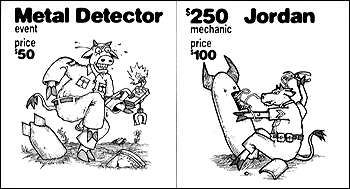![[Metroactive Arts]](/gifs/art468.gif)
[ Arts Index | Santa Cruz | Metroactive Home | Archives ]
Heads or Tails
Games for the twisted of mind and short of cash
By
CONSIDER THE FOLLOWING philosophical puzzle. If God were a game player, and our lives were are all merely the stuff of some giant board game in the sky--how much cash would God have had to pony up to buy the game in the first place?
Ready for the answer?
Well, for those who suspect that their own personal game-of-life rates up there with such classic competitive pastimes as Trouble, Monopoly, Battleship, Clue or even (ouch) Operation, then God probably paid between 15 and 30 bucks. On the other hand, for anyone whose thrill-packed life more closely resembles being chased up a building by a satanic rabbit, or being stuck among brainless zombies in the fast-food restaurant of the damned, it's almost certain that God forked over a paltry five-dollar bill to Cheapass Games of Seattle, Wash.
Founded in the early '90s by a gleefully low-rent entrepreneur named James Ernest, Cheapass Games is a five-employee company that has made a huge name for itself by producing great little games--often with perversely catchy titles like Unexploded Cow, Devil Bunny Needs a Ham, Kill Dr. Lucky and Give Me the Brain--at a fraction of the cost of those other nicely named games.
The motivating force behind CAG is Ernest's two-part belief that board games have become too expensive, and that, at a basic level, all games are alike. While most board games come in classy, color-coated boxes with shiny new dice and nifty plastic playing pieces, Cheapass's games, to put it succinctly, don't. Providing only the parts that are uniquely specific to his own games, Ernest designs his creations with the assumption that, if needed, players can borrow all that run-of-the-mill stuff from some other game.
"Part of the appeal of Cheapass games," says Ernest, with a sly, subversive chuckle, "is that we take such pride in our cheapness."
Indeed. While some CAGs do come in boxes--if you can call those wraparound cardboard cases "boxes"--most of them come in simple 7-by-10-inch envelopes. If the game includes a board, it comes on card stock, printed in separated pieces that must be assembled. Instructions--the heart and soul of the Cheapass experience--are single sheets of nonglossy paper, with clear and simple text wrapped around some very R. Crumb-style illustrations. When the game involves playing cards, they always come bound with strips of paper, cut from magazines and stuck together with scotch tape.
These things aren't called Cheapass for nothing.
All of which adds up to very affordable products. CAGs rarely run more than $7, and most of them cost closer to $5, with a brand-new line of stocking-sized card games that run a mere $4. Those are pretty attractive numbers to savvy gamers with limited pocket money, not to mention economy-challenged gift givers, although Ernest prefers not to think of it that way.
"A Cheapass Game is a hallmark of intellectual distinction, not tightfisted gift giving," he explains. "Everyone should play and display their Cheapass Games with pride." Insisting that cheapness is not the only secret to his success, Ernest says, "I think that story sells games. That's proved by the fact that some of my games flop and some don't, all at the same price point. The better the story, the better they sell.
By story, Ernest refers to the premise on which the game is based. In the case of Cheapass Games, these stories drift toward the bizarre. In the bestselling Give Me the Brain, players are zombies attempting to make it to the end of their shift at the fast-food place from hell, but have only one brain to share among the whole crew.
In Unexploded Cow--combining Mad Cow hysteria with France's unexploded mine problem--players, using detailed cards and dice, parade infected bovines across live bomb fields, earning money each time a bomb meets a cow.
"My favorite trick is to find a well-known situation and look at it from a novel perspective," Ernest explains. "Sherwood Forest has Robin Hood and poor people in it, of course, but if these poor people get irregular infusions of cash, then logically there must also be traveling salesmen. That could be the basis of a Cheapass game."
Ouch. Sounds like another bestseller. But, back to God for a minute, if the Creator really were a gamer, and our lives the machinations of the ultimate Cheapass Game, does Ernest have an idea what that game would be titled?
Of course, he does.
Says Ernest, it would be called, "Don't Make Me Come Down There."
[ Santa Cruz | Metroactive Home | Archives ]
Copyright © Metro Publishing Inc. Maintained by Boulevards New Media.
![]()

Explosive Fun: Looking for a gift for the gamer who has everything? Try 'Unexploded Cow,' a masterpiece of low-cost fun from Cheapass Games.
From the December 12-19, 2001 issue of Metro Santa Cruz.